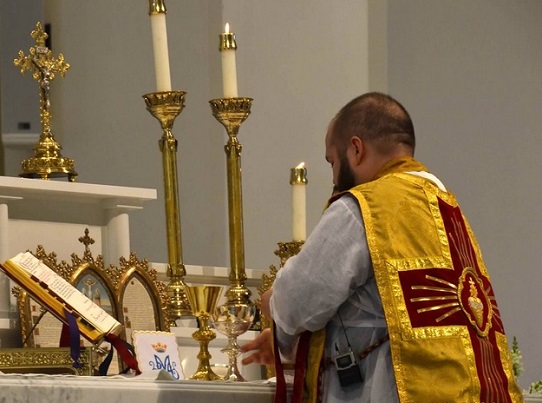The Fruits of the Mass
by VP
Posted on Sunday August 20, 2023 at 01:00AM in Documents

Fr. Tyler Sparrow, TLM Holy Name Cathedral, Raleigh NC
"The Mass has a fourfold purpose, and therefore a fourfold efficacy. It is offered, first and foremost, to adore God, whence it is called the "Sacrifice of Praise ". Secondly, it is offered to thank God for His great glory and for the benefits He has showered upon us, whence the Mass is called the "Eucharistic Sacrifice," that is the “Sacrifice of Thanksgiving ". Thirdly, it is offered to implore new benefits, notably grace, whence it is called an "lmpetratory Sacrifice ". Finally, it is a "Propitiatory Sacrifice", because it is offered to move the divine mercy to the pardon of sins.
Of these various effects of the Mass, the two which derive to men (the impetratory and the propitiatory) are usually termed the "fruits" of the Mass. Whereas the effects of the Mass insofar as it is a Sacrifice of Praise and of Thanksgiving are infinite, the “fruits" of the Mass are limited. The measure in which they are bestowed depends especially on the dispositions of those to whom they are given.
To whom are they given? To some degree or other the fruits of the Mass are bestowed upon the celebrant, upon those who serve or assist at the Holy Sacrifice, upon the person or persons for whom it is offered, upon all living, especially the members of the Church, and also upon the souls in Purgatory. The latter, however, are capable only of the propitiatory fruits of the Mass.
That the celebrant shares in the fruits of the Mass is readily understandable. No one more than he participates in the sacrifice. His active cooperation is necessary. He acts as the instrument of Christ, the High Priest, in virtue of the power received at Ordination. So he has a right to what is called the “most special fruit" of the Mass.
Sharing with him in this "most special fruit", but to a lesser degree, are the faithful who serve or assist at the Holy Sacrifice. The greater their devotion, the more plentiful are the graces God gives them through the Mass.
The person or persons for whom the priest celebrates the Mass in particular obtain what is termed the "special fruit" of the Mass. The priest may offer the Holy Sacrifice for any living person (although only privately for the excommunicated), and for the souls in Purgatory (although only privately for those to whom the Church has denied ecclesiastical burial). Since we have no way of knowing to what extent this special fruit is obtained by a soul in Purgatory for whom a particular Mass is offered, it is a pious practice to have the Holy Sacrifice celebrated repeatedly for the faithful departed.
Then, finally, there is the “general fruit" of the Mass. This comes to all the living, especially the members of the Church, and also to all the souls in Purgatory. At the Offertory of the Mass the celebrant prays that "the Sacrifice will be beneficial not only for himself and for all here present", but also for all faithful Christians, whether living or dead", not only for our own salvation," but also for that of the whole world ".
This is a most consoling thought because of our membership in the Church we share in a general way (but more intimately than those who are outside the Church) in the effects of every single Mass being offered up anywhere on earth Even when we are absorbed in our dally routine there accrue to us the beneficent effects of every Mass!
Source: The Catholic Advocate Vol 8 N17, 10 April 1959 By Msgr. George W. Shea , S.T.D.
